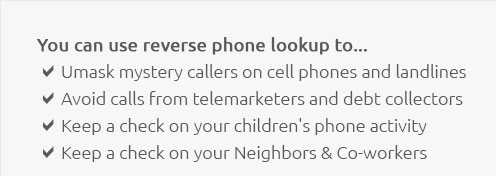 |
 |
|---|
 |
 |
|---|---|
|
|
 |
|
|---|---|
 |
|
 |
|
 |
 |
|---|---|
 |
|
A Beginner’s Guide to Telephone Lookup NumbersIn an age where technology connects us in myriad ways, the telephone remains a pivotal tool for communication, yet, intriguingly, the concept of telephone lookup numbers often eludes many. These services, designed to trace unknown callers, verify identities, and sometimes simply satiate curiosity, have evolved significantly. For the uninitiated, this article delves into the intricate world of telephone lookup numbers, offering insights, opinions, and guidance on making informed decisions. Firstly, what are telephone lookup numbers? Essentially, they are tools or services that allow you to gather information about a specific phone number. This can range from identifying the caller's name and location to more detailed information like service provider details. In today's fast-paced world, where privacy is paramount, these services can be invaluable. They offer a sense of security and control, allowing you to manage who you communicate with and when. Yet, while the utility of these services is apparent, it is essential to approach them with a nuanced understanding. For those venturing into the realm of telephone lookups, the first step is understanding the types available. Broadly, these can be categorized into free and paid services. Free services, often supported by advertising, provide basic information. They are a good starting point for casual inquiries. However, they may not always offer the depth of information that one might require. On the other hand, paid services, which often require a subscription or one-time fee, promise more comprehensive data. They typically include detailed reports, historical data, and sometimes even background checks. It is crucial to weigh the benefits of each against your specific needs and the frequency with which you plan to use these services. The decision to opt for a free or paid service is subjective and should be based on several factors, including the nature of the inquiry, the importance of accuracy, and budget considerations. One of the significant advantages of paid services is the assurance of up-to-date and reliable information, a factor that cannot be overstated in certain situations, such as dealing with persistent unknown callers or potential security threats. Moreover, the ethical considerations of using these services should not be overlooked. While they provide useful information, it is imperative to use them responsibly and legally, respecting privacy laws and the rights of individuals. When choosing a service, it is advisable to conduct thorough research. Look for reviews, user experiences, and expert opinions to gauge the reliability and accuracy of the service. Additionally, consider the user interface and customer support, as these can significantly impact the overall experience. Some services offer mobile apps, which can be convenient for on-the-go inquiries. Furthermore, it's worth noting that no service can guarantee 100% accuracy, as databases are constantly updated and can contain outdated information. In conclusion, telephone lookup numbers offer a fascinating blend of convenience and power, enabling users to navigate the complex web of modern communication with greater confidence. Whether you are looking to identify a mysterious caller or verify information, understanding the nuances of these services is essential. As technology continues to advance, these tools will undoubtedly evolve, offering even more sophisticated features. For now, making informed decisions based on your needs, ethical considerations, and thorough research will ensure that you utilize telephone lookup numbers effectively and responsibly. https://www.geeksforgeeks.org/reverse-phone-number-lookup/
In this article, we'll explore the 10 best free reverse phone lookup tools available in 2025 that offer valuable information without requiring a subscription. https://www.spokeo.com/reverse-phone-lookup
Spokeo will search through millions of phone records, including both landline and cell phone numbers. One of the fastest services available, we provide free ... https://apps.apple.com/us/app/reverse-lookup/id1086846780
Reverse Lookup is a FREE reverse phone lookup app for iOS devices that retrieves all available information associated with a phone number.
|
|---|